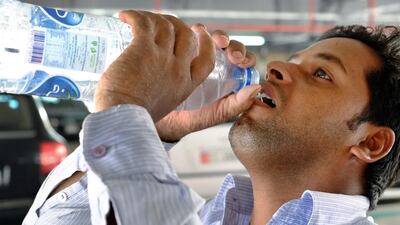As the clock struck 12.30pm on Sunday, hundreds of thousands of construction workers downed their tools to eat and rest in compliance with the three-month midday break that began across the country.
With temperatures peaking during the summer months, the Ministry of Labour has said that hourly inspections will be carried out until September 15. It has warned that companies which deny labourers the two-and-a-half hour break may face closure and fines of up to Dh15,000.
Some workers, however, do not fall under the rule. The exceptions mostly stem from the reasoning that those who do not work directly under the sun do not need a break.
According to the law, however, projects such as laying asphalt and pouring concrete are classified as necessary on safety grounds whether or not labourers are working under the sun.
Labourers of Combined Group Contracting were hard at work pouring roads on Sunday, well into the break time.
A foreman in charge of laying many of the new roads on Reem Island said that work was tough but the cost of halting would be too significant to stop.
“It’s a technical matter but if we stop work, the asphalt for these roads will break and become useless. The government can’t afford that and neither can we, so we have permission to work,” he said.
But even though some do not get the full break, employers are still required to provide first aid, air-conditioners, sunshades and cold water for workers. Combined Group Contracting goes the extra step and provides lemons, ice and electrolytes. It also allows workers to go home if they are fatigued.
“Who wouldn’t like to stop working, it’s not like the heat stops for us, but we can’t there’s too much money involved,” the foreman said. “However, if any of my workers feel sick, tired, or need water then I bring it to them, I tell them go home and rest if they are getting tired.”
In Dubai, some workers were being bused back to their camps for the break, while many were seen resting inside worksites in shaded, air conditioned rooms.
Farooq Sheikh, 38, a Bangladeshi national, was among them.
“It is important for workers like us to have a break during these months,” said Mr Sheikh, a mason with ETA Ascon, employed on one of the residential projects at Damac by Akoya. “I take care of myself by drinking plenty of water.”
The company said it provided water coolers, supplement drinks and first-aid facilities at most worksites. “We have 10 rest rooms on this site,” said Ravindran K, a senior manager at Ascon. “We tell them that they have to be inside shaded rooms and drink more water during these months. We provide them oral rehydration solutions and lemon water. We are thinking of distributing laban from tomorrow.”
Mr Ravindran said their first-aid facility was staffed with a male nurse at all times to take care of small injuries and quickly attend to heatstrokes.
However, not all workers were so fortunate.
The Dubai Tram’s underground site in Marina was buzzing with activity. “We haven’t been told to rest,” said a technician on the site, who did not want to give more details. “We are working in the basement and the break does not apply to us. It is only for those working in the sun.”
Some workers were seen sleeping on the pavement outside the tram station, in breach of the ministry’s requirements to provide well-covered rest areas.
Besix, a firm that has more than 2,500 workers at the same site, said they ensured their workers had the necessary rest time. A spokesman for the contracting company said: “We highly value the health and safety of our workforce and are committed to enforce all possible measures in that respect.”
pkannan@thenational.ae
nalwasmi@thenational.ae

